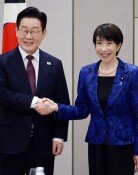Government Suspends Funding for Internship Programs for College Students
Government Suspends Funding for Internship Programs for College Students
Posted July. 15, 2005 03:02,
A leading mid-sized enterprise recruited college students as interns in the first half of this year in unison with the governments industry-academy cooperation program and obtained excellent results.
It selected the talent after observing its interns for a certain period, and its image among undergraduates has greatly improved. The fact that the government subsidized 300,000 won out of 800,000 won of the monthly wages for its interns was also fascinating.
The company applied for the second-half program starting from August 1, and has recently finished interviews of applicants.
On July 12, however, it was told from the participating university that the government abruptly suspended subsidies, and it had to cancel the whole intern recruitment plan.
Industry-academy cooperative education programs and other workplace experience projects for youth, which have been promoted by the government as part of measures to deal with youth unemployment, are being suspended one after another in the second half of this year.
This is because the governments excessive economic stimulus package has already exhausted most of the entire budget for this year within the first half.
Universities and enterprises said on July 14 that the Ministry of Labor (MOL) made an announcement on July 12 to universities and local governments nationwide that it had to suspend support for workplace experience programs for youth in the second half of this year, as it had already spent most of the budget for the projects, 62.5 billion won, in the first half of this year.
Workplace experience programs for the youth are classified into two types: a) Intern employment assistance system where the government provides 600,000 won per capita every month for companies hiring unemployed youths aged between 18 and 30 for nine months at a maximum, b) the training assistance system, where the government provides 300,000 won per capita on a monthly basis for businesses recruiting undergraduates as interns for six months at a maximum.
The industry-academy cooperative education program, which is the core of the training assistance system, has been promoted jointly by the Presidential Committee on Balanced National Development (PCBND), the Korea Chamber of Commerce and Industry (KCCI) and the Korean Education Association (KEA) as the participatory governments national agenda for new industry-academy cooperation.
Students participating in the program can earn eight to 15 credits. The program is very popular among students as they can also get work experience before choosing their career, and as they experience the flow of new technologies.
An official from the Government-Private Sector Consultation Organization for Industry-Academy Cooperation (GPSCOIAC), which is in charge of the industry-academy cooperative education program, said that the organization had confirmed with the PCBND and MOL before making its public announcement on inviting universities and enterprises to the program in May. He added that the agency was abruptly told that the government would be unable to provide subsidies, with the enforcement of the program on August 1 just around the corner.
It does not make sense how [the government] spent the whole budget for a year just in six months. The government has simply made a fuss about measures to cope with youth unemployment without securing a big enough budget, condemned the official.
Businesses and universities also responded that they could not understand.
The government now tells that it is up to us whether or not to recruit college students as our interns. This case is typical of the show-off administration, where the government merely pretends to do something but eventually gives it up later, criticized an industry official.
An official from the Ministry of Labor explained, Most of the entire budget for a year has been front-loaded in the first half as part of the government effort to boost the economy. In the first half of this year, however, the number of applicants who want long-term workplace experience over six months has grown compared to last years, which is why the budget was exhausted much earlier.
Keuk-In Bae bae2150@donga.com




![[속보]美 “미국인은 이란 당장 떠나라” 대사관 긴급 공지](https://dimg.donga.com/c/138/175/90/1/wps/NEWS/IMAGE/2026/01/13/133147285.1.jpg)


